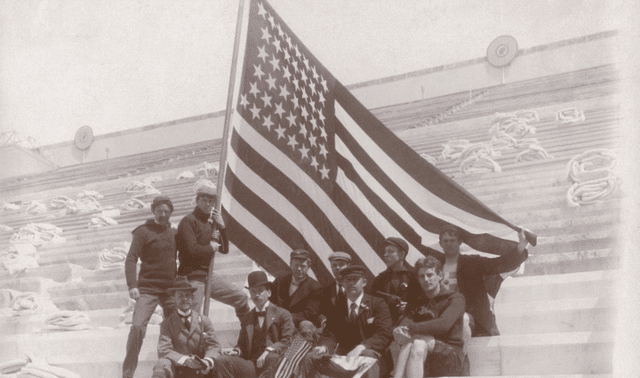Sign up for the Family Tree Newsletter! Plus, you’ll receive our 10 Essential Genealogy Research Forms PDF as a special thank you.
Get Your Free Genealogy Forms
"*" indicates required fields
Though best known today as the capital of country music, Nashville was noteworthy in American history and culture long before the first twang of the Grand Ole Opry. As the northern terminus of the Natchez Trace, the city saw plenty of traffic. And as the capital of Tennessee and home to the Tennessee State Library and Archives (TSLA), Nashville is the prime place to start researching Volunteer State ancestors. The city, which merged with Davidson County in 1963, boasts rich ethnic heritage, as well. If your family hails from Music City, we’ll show you how to get singing in the right key.
Transplants to Tennessee
Interestingly, Nashville began as part of North Carolina. Although Spanish explorers and French trappers visited the site—briefly known as “French Lick”—Nashville didn’t see permanent settlers until after James Robertson and John Donelson trekked there from the Watauga settlement in what’s now East Tennessee. They arrived at the banks of the Cumberland River on Christmas Day 1779 and built Fort Nashborough (named in honor of Revolutionary War Gen. Francis Nash) at today’s downtown Nashville. Some 60 families followed in flatboats, reaching the fort April 23, 1780. They were the first of a wave of North Carolina and Virginia transplants, mostly English and Scots-Irish, who would build Nashville—as it was renamed in 1784 when incorporated by the North Carolina legislature.
The TSLA has a printed index of individuals who received North Carolina land grants in Tennessee and land grants directly from the state of Tennessee. The staff will check the index for you; e-mail reference.tsla@tn.gov with one ancestor’s name. With a result, you can order a copy of the original land grant.
Although Tennessee gained statehood in 1796, it wasn’t included in the US census until 1810. Even then, only the census results for Rutherford County survived. Because Rutherford split in 1803 from Davidson County, this enumeration includes some Nashville residents. Much of the 1820 Tennessee census has also been lost, but 24 pages of Nashville schedules survive.
To make up for pre-1830 census gaps, consult tax lists, which are available from the TSLA and the Family History Library (FHL). For Davidson County, lists cover various years from 1789 to 1839, plus 1871 to 1873 and 1881 to 1900. There is an index for 1812, and most reels are available from the TSLA via interlibrary loan.
Border-state battleground
Nashville was chartered as a city in 1806 and won the race to become the new capital of the state by a single vote in 1843. Antebellum growth was slow, however, despite the election of two Tennesseans—Andrew Jackson and James K. Polk—as US presidents. Steam locomotives, gas street lamps and public schools arrived in the 1850s. The first Catholic church was built in 1847, and the first Jewish religious organization was founded in 1851. The state capitol, begun in 1845, wasn’t completed until 1859, shortly before the outbreak of the Civil War.
Tennessee was the last state to join the Confederacy, on June 24, 1861, but Nashville quickly became the focus of hostilities. Union forces occupied the city after the fall of Fort Donelson Feb. 15, 1862. Confederate forces threatened to retake the city in December 1864, leading to the Battle of Nashville—a Union victory that effectively ended the war in the West.
When researching Nashville soldiers in the Civil War, keep in mind that Tennesseans fought on both sides. The TSLA has a wealth of resources, mostly for Confederates, at www.tn.gov/tsla/NewSite/Collections/Military/CivilWar.htm, including indexes to pension applications and veterans’ questionnaires. The Tennessee Virtual Archive is strong on Civil War materials, as is the Tennessee Civil War Sourcebook, a searchable collection of over 7,000 articles chronicling the conflict in Tennessee.
For records of earlier conflicts, including Indian wars and the War of 1812 (for which Tennessee earned its “Volunteer State” nickname), consult the National Archives and Records Administration.
Boom-time records
Unlike some Southern cities that struggled in the war’s aftermath, Nashville boomed as a trade center. By 1897, it was bustling enough to host a World’s Fair, for which a still-standing replica of the Parthenon was erected.
City directories chronicling Nashville’s growth are available in digitized form from the TSLA. The online collection includes various years between 1853 and 1881, plus 1924. The FHL also has directories for select years between 1866 and 1926.
Newspapers began telling the emerging city’s story as early as 1799, when Nashville’s first newspaper, Henkle’s Tennessee Gazette & Mero Advertiser, was published. The TSLA holds a vast collection of newspapers on microfilm, including almost every extant newspaper published in Tennessee—the fruits of a filming project begun in 1957. You can check an index of titles at www.tn.gov/tsla/history/newspapers/tn-paper.htm. The subscription GenealogyBank site has a few early Nashville newspapers in searchable, digitized form, including Tennessee Gazette (1800 to 1807), Nashville Banner and Nashville Whig (1834 to 1836), and Nashville Gazette (1819 to 1827). The TSLA has an index to death notices in local newspapers covering 1855 to 1907.
As is typical with Southern states, vital recordkeeping arrived late. Nashville, however, was among four cities that started registration before it was mandated statewide, beginning with deaths in 1874 and births in 1881. You can request a TSLA search of these records by mail if you know the year of the event. The Metro Archives of Nashville and Davidson County has online indexes to Nashville city birth records for 1881 to 1913 and Davidson County birth records for 1908 to 1912. You might be able to find a delayed birth certificate; the TSLA will search these records for births from 1869 to 1909. Later delayed birth records are at the Office of Vital Records.
Statewide birth and death registration began in 1908, lapsing in 1913 before resuming in 1914 with more genealogically useful data. The TSLA has an online index of 1908-to-1912 death records and microfilm of these birth and death records. Before its merger with Nashville, Davidson County kept its own death records from 1900 to 1913, which are indexed at www.tn.gov/tsla/history/vital/davidson1.htm. The TSLA holds statewide death records from 1914 to 1959, and has indexed these through 1932 at www.tn.gov/tsla/history/vital/tndeath.htm. Later death records and post-1913 birth records are at the Office of Vital Records.
Marriage records didn’t begin statewide until 1945. For earlier marriages, recorded on the county level, start by checking with the TSLA and FHL microfilm. Records of Nashville marriages from 1941 to 1945 are at the Metropolitan Archives. From 1960 on, consult the Office of Vital Records.
Early divorces had to be approved by the General Assembly; consult the index to names in Acts of Tennessee 1796 to 1850. Court minutes are another place to check. See www.tn.gov/tsla/history/howdoifind.htm#07 for tips on finding records of divorce. Or perhaps, since this is the capital of country music, we should quote Tammy Wynette and say “D-I-V-O-R-C-E.”
Fast Facts
- Settled: 1779
- Incorporated: 1784, chartered in 1806
- Nicknames: Music City, Athens of the South
- State: Tennessee
- County: Davidson (consolidated city-county government)
- Area: 526 square miles
- Primary historical ethnic groups: African-American, English, German, Scots-Irish
- Primary historical industries: banking, transportation, higher education, music, publishing, health care
- Famous residents: Roy Acuff, Chet Atkins, Al Gore, Red Grooms, Faith Hill, Andrew Jackson, Kathy Mattea, Tim McGraw, Minnie Pearl, James K. Polk, Taylor Swift, Randy Travis, Oprah Winfrey
- Population: 1850–10,105; 1950–174,307; Current–605,473
Timeline
- 1779 James Robertson and John Donelson arrive at the site of Fort Nashborough
- 1796 Tennessee is admitted to the Union
- 1843 Nashville becomes the state capital
- 1861 Tennessee secedes from the Union
- 1864 Union forces win Battle of Nashville
- 1866 Fisk University is founded
- 1877 World’s first “airmail” flies from Nashville to Gallatin via balloon
- 1890 Vanderbilt plays Peabody in Nashville’s first football game
- 1897 Centennial Exposition opens
- 1907 Teddy Roosevelt calls the Maxwell House Hotel’s coffee “good to the last drop”
- 1912 Goo Goo candy bar is invented
- 1925 Grand Ole Opry begins
- 1941 First US FM radio station, W47NV (now WSM), goes on the air
- 1963 Nashville and Davidson County governments merge
Toolkit
Websites
- Davidson County USGenWeb
- Nashville City Birth Records, 1881 to 1913
- Tennessee Virtual Archive
- Tennessee Civil War Sourcebook
Publications
- Guide to Civil War Nashville by Mark Zimmerman (Battle of Nashville Preservation Society)
- A Guide to Historic Nashville, Tennessee by James A. Hoobler (History Press)
- Middle Tennessee Journal of Genealogy & History (Middle Tennessee Genealogical Society)
- Nashville: Yesterday & Today by Nicki Pendleton Wood, Dana Kopp Franklin, E. Thomas Wood and George Zepp (West Side Publishing)
- Research in Tennessee by Gayle Williams Bamman and Charles A. Sherrill (National Genealogical Society)
Organizations and Archives
- Metropolitan Government Archives, 801 Green Hills Village Drive, Nashville, TN 37215, (615) 862-5880
- Metropolitan Government of Nashville and Davidson County, County Clerk, 523 Mainstream Drive, Nashville, TN 37228, (615) 862-6050
- Middle Tennessee Genealogical Society, Box 330948, Nashville, TN 37203, (615) 297-3085
- Nashville Public Library, 615 Church St., Nashville, TN 37219, (615) 862-5800
- Tennessee Historical Society, War Memorial Building, Ground Floor, Nashville, TN 37243, (615) 741-8934
- Tennessee Office of Vital Records, Central Services Building, First Floor, 421 Fifth Ave. N, Nashville, TN 37247, (615) 741-1763
- Tennessee State Library and Archives, 403 Seventh Ave. N, Nashville, TN 37243, (615) 741-2764
Records at a Glance
Birth records
- Begin: 1881
- Research tips: Vital recordkeeping began statewide in 1908; records for 1913 are lost.The TSLA will search early records for you. An index to city birth records for 1881 to 1913 is at freepages.family.rootsweb.ancestry.com/~nashvillearchives/births81.html.
City directories
- Begin: 1853
- Research tips: Check out the digitized collection of directories for various years from 1853 to 1881 plus 1924 at www.tn.gov/tsla/CityDirectories.htm.
Death records
- Begin: 1874 (statewide 1908, none for 1913)
- Research tips: Start with the indexes for 1908 to 1912 and 1914 to 1932. The TSLA has death records from 1914 to 1959, later ones are at the Office of Vital Records.
Deeds
- Begin: 1784
- Research tips: The TSLA will search for a deed if you can provide the name of the individual, the county and a five-year date span.
Marriage records
- Begin: 1789 (statewide 1945)
- Research tips: The TSLA can help locate pre-1941 marriages. E-mail requests to reference.tsla@tn.gov must include the names of the groom and bride, county of marriage, and the date of the marriage. Nashville marriage records 1941 to 1945 are at the Metropolitan Archives. Details for more recent marriage records can be found at www.tennessee.gov/tsla/history/mailcnty.htm.
Probate records
- Begin: 1783
- Research tips: The TSLA will check an index up to 1861 for free; see www.tennessee.gov/tsla/history/mailcnty.htm#Probate. Wills after 1861 are on microfilm and unindexed.
Tax lists
- Begin: 1789
- Research tips: Check the TSLA’s directory of tax lists at www.tennessee.gov/tsla/history/county/taxlist.htm. The archives will send copies of published tax lists for $5. If a name appears in an index with a page number of the original record, the TSLA will copy the tax list entry for $20.
Top 5 Historic Sites
- Belle Meade Plantation, 5025 Harding Pike, Nashville, TN 37205, (615) 356-0501.The “Queen of the Tennessee Plantations” is an 1853 Greek Revival where costumed guides re-create its heyday as a thoroughbred farm.
- Country Music Hall of Fame and Museum, 222 Fifth Ave. S, Nashville, TN 37203, (615) 416-2001. From Elvis Presley’s gold Cadillac to Minnie Pearl’s hats, and Bill Monroe’s cane to Junior Samples’ “Hee Haw” denim overalls, this museum celebrates the roots of country music with exhibits, artifacts and multimedia.
- Fort Nashborough, Between Church and Commerce streets, Nashville. This scale-model re-creation of Nashville’s first fort stands in Riverfront Park, an easy walk from the bustling downtown Nashville of today.
- The Hermitage, 4580 Rachel’s Lane, Nashville, TN 37076, (615) 889-2941. Once home to Andrew Jackson, the Hermitage has been restored to its 1837 appearance and contains almost all of its original furnishings.
- Tennessee State Museum, 505 Deaderick St., Nashville, TN 37243, (615) 741-2692. One of the largest museums in the nation, this treasure trove near the state capitol contains interpretive exhibits beginning 15,000 years ago with prehistoric people and continuing through the early 1900s with special displays of furniture, silver, weapons, quilts and paintings. Across the street is the state military museum.
Related Resources
From the December 2011 issue of Family Tree Magazine
More great genealogy resources from Family Tree Magazine:




